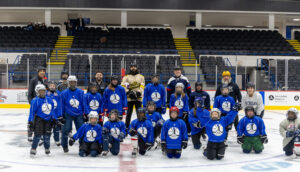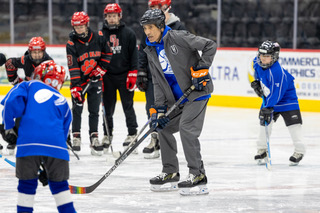By Harold C. Ford
While many of Flint’s most notable athletes found success in basketball, football, baseball, and track and field, Rico Phillips found it in ice hockey.
The son of an African American father and a German immigrant mother, Phillips grew up in Flint and graduated from Flint Southwestern High School in 1987. In March, he was inducted into the Greater Flint African American Sports Hall of Fame
(GFAASHOF), making him one of just four Flint athletes feted in the sport of ice hockey between GFAASHOF and the Greater Flint Area Sports Hall of Fame. The honor also makes him the only African American with Flint hall of fame recognition specifically for ice hockey.
An East Village Magazine (EVM) review of 265 individuals and 15 teams in the GFAASHOF found only one other reference to ice hockey. Norman Graham Jr. was inducted in 2018, and while a sentence of his seven-paragraph tribute indicates he “was one of seven African-American children from Flint’s Southside to join the Greater Flint Hockey Association,” and that “he was selected team captain” and “the leading scorer on all but two of his teams,” the rest of the message notes Graham’s long list of track accomplishments.
Despite making history, in an interview with Phillips after his hall of fame induction, the star athlete noted that ice hockey was “the furthest thing” he believed he would ever participate in.
From floor to ice
Phillips recalled his first experience with hockey taking place in the gymnasium of Flint’s Lincoln Elementary School. That’s where he discovered that he enjoyed a game played with sticks used to shoot a puck or ball into a net.
“I really loved it,” Phillips said, adding that he had liked playing goalie.
But at home there was less hockey and more basketball, as his backyard featured a hoop in the driveway where the older neighborhood boys would come to compete.
“I was always the short guy,” Phillips remembered. “I never was really good at it.”
So, he volunteered to grab the whistle and referee those driveway basketball games – an experience that would serve him well in years to come as an on-ice hockey official.
Not being built for basketball isn’t what led Phillips to hockey, however. Instead, it was a bit of serendipity.
Phillips got his certification in first aid and CPR while in eighth grade, which led the head athletic trainer at Flint Southwestern High School (SWHS) to ask Phillips to be an assistant. Phillips immediately said yes.
“It was an opportunity to use hands-on skills,” he recalled. Plus, Phillips wanted to become a firefighter at the time, and he knew the experience and first aid-CPR training would be useful.
During his freshman and sophomore years at Southwestern, Phillips saw the hockey teams up close from his position as an assistant trainer.
“I knew there’s going to be some injuries so I get to hone my [first aid and CPR] skills,” Phillips recalled.
That experience as an assistant trainer for Southwestern’s ice hockey team turned out to be transformational. “I couldn’t believe the speed, the skill, the passion,” he said. “It was from there that I found my love for the sport.”
Phillips’ budding sideline interest led him to ask the ice hockey coach if he would teach him how to skate.
“He looked at me as if I was kind of crazy,” Phillips said, but the team’s assistant coach did end up working with Phillips, one-on-one, to teach him.
“That’s how I got on the ice,” Phillips said. “At first I was just grabbing the boards and holding onto them the whole time.”
After a short stint on the SWHS team during spring hockey season, Phillips came back for more.
“I don’t know why I came back to hockey after that [spring] season because I was getting the snot knocked out of me,” he said with a laugh.
In fact, Phillips recalled his dad saying to him, “You don’t want to play hockey; they get their teeth knocked out.”
A few years later, Phillips did, indeed, lose his front teeth playing hockey, but it didn’t much matter by then.
“I was having the time of my life,” he said.
“Go ref basketball where you belong”
During his junior year at SWHS, Phillips remarkably advanced to a head trainer position for all of Genesee County high school hockey.
In locker room conversations between periods, adult ice hockey officials convinced Phillips, still a senior in high school at the time, that he should become an on-ice referee. It would be challenging for certain, but he would be compensated for his time.
While the challenge of refereeing was expected to come from having to skate at the same speed as the players (and stop quickly, which Phillips had yet to learn to do well), the challenge would also prove to come from Phillips’ complexion in the nearly all-white world of ice hockey arenas.
“I would start hearing things from people in the stands,” he recalled. “Why don’t you go ref basketball where you belong?” was one such example.
White referees would insultingly remind him that a faceoff with a puck drop was not the same as a jump ball in basketball.
“I didn’t know how to accept it,” Phillips recalled of hearing such things from his colleagues.
Then, while officiating at the former IMA ice arena in Flint, 17-year-old Phillips admittedly blew a call. He was summoned to the bench by an angry coach, and once there, the team’s assistant coach called him a “n*****” and threatened to assault him in the parking lot after the match.
“It was a moment that shook me up,” Phillips remembered. “There was nobody that could support me; I refed the rest of the game in a fog.”
Ultimately, Phillips’ co-official (a white adult) skated over to the bench and threw the offending coach out of the contest.
After the match concluded, he offered Phillips advice that remains salient for him to this day: “Rico, either today you’re going to grow up or you’re going to stay a kid. You’re going to come across people that are racist in your life, and it’s how you’re going to deal with that racism that’s going to dictate how happy you are.”
His co-official reminded Phillips that he, Phillips, could’ve and should’ve thrown the offending coach out of the contest.
“But I had your back,” he said. “People will have your back.”
Even knowing he had allies on the ice, after the incident, Phillips considered leaving the sport that he’d grown to love.
Racism continued to taint his hockey experience, but he said he learned how to weather it over time.
Early on, Phillips said he used self-deprecating humor. “I was endearing because I would make people laugh,” he explained. But later, he realized that he was “normalizing bigotry,” and he’d had enough, saying to himself, “this shit ain’t funny no more; I’ve gotta stop joking.”
Adding to the hate he endured on-ice, Phillips also caught hell from his Black friends who didn’t understand his passion for ice hockey. “Why are you playing this white sport?” he remembers being asked.
Phillips struggled to explain to his friends the speed and skill of ice hockey.
“All they really knew about the sport is there was fighting,” he said.
Phillips eventually moved past the criticisms of his friends, though, noting, “I began to become proud I was the only Black person on the ice.”

Rico Phillips (back row, left) and members of FICYHP. (Photo by Savannah Edwards)
Flint Inner City Youth Hockey Program
Throughout his hockey career, Phillips came to realize that many of the participants in youth ice hockey were white and rather privileged. That’s what sparked the idea for a Flint Inner City Youth Hockey Program (FICYHP) to serve children of color. He said he longed to “influence young Black families … about how the sport is so great and offers so much.”
“Diversifying the sport is my goal,” Phillips explained. He hopes to help move ice hockey to a stage where a future Rico Phillips is not the only person of color to ref or play. “When that happens, racial slurs will begin to disappear from the sport,” he said.
FICYHP, established in 2010, now lists its mission “to introduce, teach how to ice skate and develop hockey skills to kids who would otherwise not have an opportunity to enjoy the sport” on its website’s home page.
With considerable pride, Phillips told EVM that 16 FICYHP graduates have gone on to play organized hockey at higher levels. In particular he referenced William Walker, who began playing FICYHP hockey at seven-years-old and was eventually
awarded a partial-ride scholarship at Michigan’s Adrian College.
“He’s furthering his education,” Phillips said. “There’s legacy there.”
Reflecting on his recent hall of fame induction, Phillips added that “legacy is important” to him as he grows older and passes his sport on to the next generation.
He said he hopes to be remembered as a giving person.
“It’s been my passion my entire life,” Phillips said. “I wanted to help.”
Phillips was inducted into the GFAASHOF on March 23 along with basketballers Thomas McGill, Anthony Pendleton, Demetrius Calip, and Evette Ott; tracksters Edward Taylor and Eugene Taylor; and baseballer Hershel Pritchard.
Team inductions included the 1984 and 1985 Flint Northwestern HS men’s basketball teams and the 1980 Beecher women’s basketball team.
This article also appears in East Village Magazine’s May 2025 issue.








You must be logged in to post a comment.